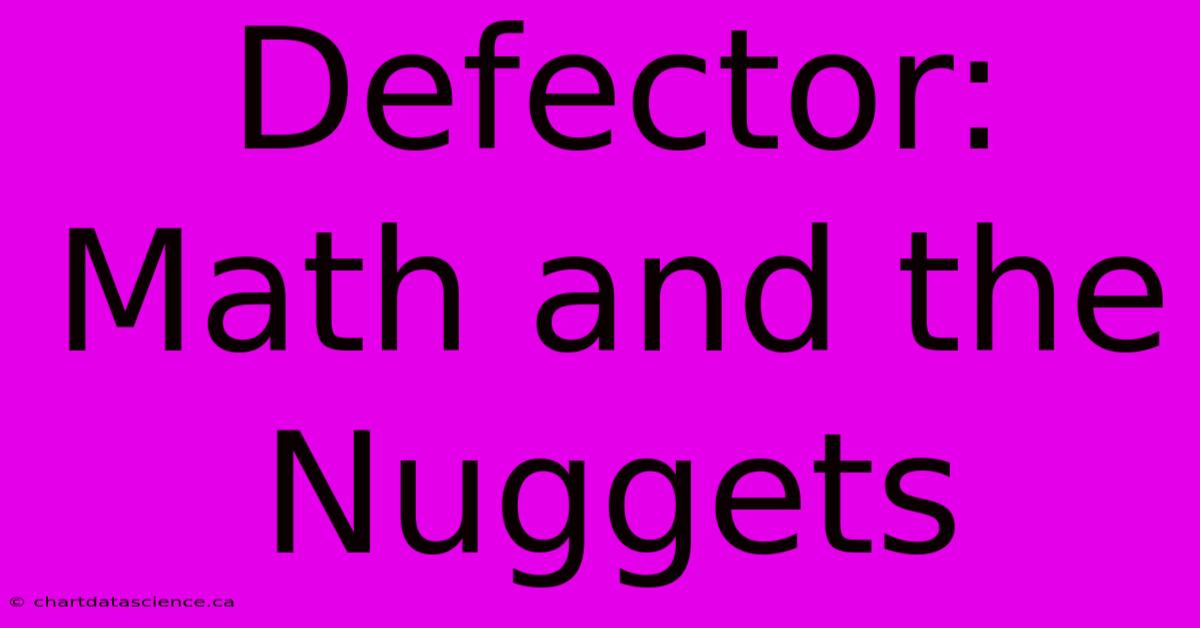Defector: Math And The Nuggets

Discover more detailed and exciting information on our website. Click the link below to start your adventure: Visit My Website. Don't miss out!
Table of Contents
Defector: Math, Nuggets, and the Allure of the Unexpected
The seemingly simple question – "Can you buy exactly any number of McNuggets using only the 6, 9, and 20-piece boxes?" – hides a surprisingly deep mathematical puzzle. This classic problem, often presented as a playful riddle, is a gateway to exploring the fascinating world of number theory and the concept of the Frobenius Coin Problem, also known as the coin problem or the McNugget problem. Let's delve into the mathematics behind this seemingly innocuous fast-food conundrum.
Understanding the McNugget Problem
The core of the McNugget problem lies in determining the largest integer that cannot be expressed as a non-negative integer linear combination of 6, 9, and 20. In simpler terms, what's the biggest number of McNuggets you can't buy using only boxes of those sizes?
This isn't just about figuring out individual numbers; it's about understanding the underlying mathematical structure. We're exploring the possibilities and limitations of combining different quantities to achieve specific totals.
The Approach: A Systematic Exploration
We can't simply try every number. We need a more strategic approach. One method involves systematically checking numbers, starting from the smallest, and determining whether they can be expressed as 6a + 9b + 20c, where a, b, and c are non-negative integers.
Initially, we might try brute force, testing numbers one by one. However, as the numbers grow larger, this becomes increasingly inefficient. Fortunately, more elegant mathematical techniques exist.
The Frobenius Coin Problem and its Implications
The McNugget problem is a specific instance of the Frobenius Coin Problem. This problem, for two relatively prime integers a and b (meaning their greatest common divisor is 1), states that the greatest integer that cannot be written in the form ax + by where x and y are non-negative integers is ab - a - b.
This formula provides a solution for the case with only two box sizes. Unfortunately, a general closed-form solution for three or more integers doesn't exist, making the McNugget problem significantly more challenging.
Solving the McNugget Problem: A Numerical Approach
Despite the lack of a general formula for three integers, we can still solve the McNugget problem numerically. By systematically exploring combinations and leveraging some insights from number theory, we can eventually determine the largest number of McNuggets that cannot be purchased. This involves considering the possible combinations of 6, 9, and 20-piece boxes and identifying the gaps in the attainable numbers.
Through this process, we find that the largest number of McNuggets you cannot buy using only 6, 9, and 20-piece boxes is 43. Any number greater than 43 can be obtained using a combination of these box sizes.
Beyond the Nuggets: Applications of the Frobenius Coin Problem
The seemingly trivial McNugget problem opens doors to more complex scenarios. The Frobenius Coin Problem has applications in various fields, including:
- Scheduling: Optimizing tasks with different durations.
- Cryptography: Certain aspects of code breaking and encryption.
- Combinatorics: Studying combinations and arrangements.
The McNugget problem illustrates how simple questions can unveil profound mathematical concepts. It highlights the beauty and power of mathematics in unexpected places – even in the world of fast food. So, the next time you're facing a seemingly simple problem, remember the McNuggets: sometimes the simplest things hold the most intriguing mathematical depths.

Thank you for visiting our website wich cover about Defector: Math And The Nuggets. We hope the information provided has been useful to you. Feel free to contact us if you have any questions or need further assistance. See you next time and dont miss to bookmark.
Also read the following articles
| Article Title | Date |
|---|---|
| Musk Ramaswamy Meet Lawmakers On Doge | Dec 06, 2024 |
| Dujardins One Year Olympic Suspension | Dec 06, 2024 |
| Po E 2 Early Access Unlock Times By Region | Dec 06, 2024 |
| Indiana Jones Great Circle Areas For Improvement | Dec 06, 2024 |
| T20 Bowlers A Slow Decline | Dec 06, 2024 |
